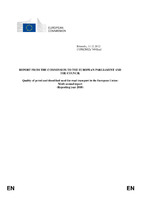| dc.description.abstract | Directive 98/70/EC1 sets minimum technical specifications on health and environmental grounds for fuels to be used for vehicles equipped with positive-ignition and compression-ignition engines. Fuel quality is environmentally important because it affects engine pollution emissions and thus air quality. It also affects the ease and cost with which desired pollution and greenhouse gas emission limits can be achieved by manufacturers.Non-respect of the fuel specification can lead to increased emissions (for example excess oxygenates can increase NOx emissions) and might damage engine and exhaust after-treatment systems (for example excess sulphur damaging catalysts) leading to greater air pollution. In order to ensure compliance with the fuel quality standards mandatory under this Directive, Member States are required to introduce fuel quality monitoring systems.Article 8 of Directive 98/70/EC requires the Commission to publish an annual report on fuel quality in the Member States. This ninth Commission Report summarises Member States’ submissions on the quality of petrol and diesel, as well as the volumes sold, for 2010.All Member States submitted a full report for 2010. Some Member States reported later than the required deadline of 30 June. The timeliness of the submission of reports was slightly worse than in 2009, 17 Member States submitted their 2010 report before the annual deadline, of the remaining 10 reports 5 were received 3 months or more after the reporting deadline. Fuel quality monitoring data in 2010 showed that the specifications for petrol and diesel laid down in Directive 98/70/EC were in general met and few exceedances were identified. For petrol the main parameters where exceedances were identified were research/motor octane number (RON/MON)2, summer vapour pressure3, distillation/evaporation at 100/150°C4 and the maximum sulphur content. For diesel the main parameters where exceedances were identified were sulphur content, distillation 95% point and cetane number. As exceedances are relatively rare, and most Member States take action to remove non-compliant fuel from sale, the Commission is not aware of any negative repercussions on vehicle emissions or engine functioning. However, the Commission urges Member States to continue to take action to ensure full compliance so that such problems do not arise in the future. Low sulphur content helps reduce air pollution and the introduction of new engine technology. A new specification for automotive road fuels came into force on 1 January 2009 which limits the sulphur content of all automotive road fuels in the EU to 10 ppm (sulphur-free fuels). This represents the second year of reporting since this requirement came into force and the average sulphur continued below this level in 2010. *Excludes France, which did not report in 2003 – 2005. **Excludes Malta, which did not report in 2006. ***Excludes Luxembourg, which did not report in 2007, 2008 or fully in 2009. National fuel quality monitoring systems still differ considerably. However, the Directive's requirements are expected to promote homogeneity and to improve the quality of reporting. |

